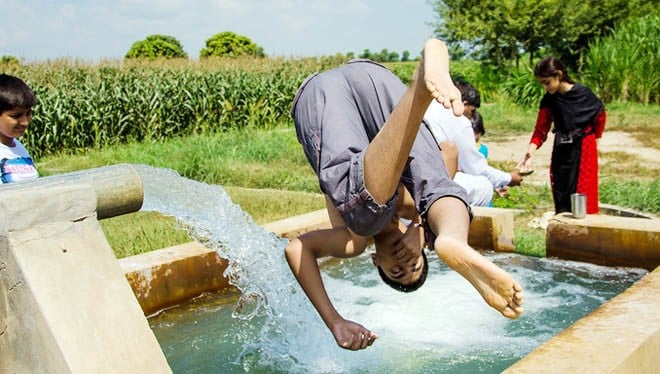

Presently, the summer season is at its peak and mercury is touching a record high in the city. Extremely hot weather and prolonged power outages have added to the problems of the less privileged. But today it seems they have come up with an interesting option.
Ask a villager and he would say the tubewells in the area are the best place to beat the heat. Built in the middle of agricultural fields and surrounded by thick foliage and dense trees, these tubewells offer the revelers a unique environment and an opportunity to bathe in fresh and cool water and sit under the trees for long hours.
One can very well imagine what the rural population has to go through, given the 16-20 hours of loadshedding they have to face every day. Most people are clueless about what to do to get even a temporary relief from the scorching heat. A dip in the canal is always an option but the people are advised not to avail this as the canal water contains sewage waste released by the myriad housing societies situated along the banks.
Interestingly, tubewells are now accessible to the urbanites as well. Over the years, the people living in the city have won access to them whether they know the owners or not.
What has happened is that some land and farm owners in the outskirts of Lahore have opened their tubewells to the general public who can utilise them by paying a certain amount as fee. This option is cost-effective and the common perception is that the owners do not charge much.
The tubewells have to be run in any case -- for irrigation purposes. So, any amount of money coming in under the head of fee/ticket is welcome.
This also helps the owners recover, sometimes partially, the fuel and electricity costs incurred on running their tubewells.
Nadeem Aslam, a resident of Allama Iqbal Town, is a frequent visitor to a tubewell named "Malkaan da tubewell" after its owners who belong to the Malik tribe. This one is located close to the Bund Road in Babu Sabu area and is visited by a large number of people.
According to Aslam, the tubewell is accessible via a road which is not in a good condition. But this hasn’t deterred common people from thronging the place. Every passerby, shopkeeper or resident present along the road knows of Malkaan da tubewell and volunteers are there to help and explain the directions.
Aslam says he is yet to go to the tubewell this year but last year it cost him Rs50 per person.
Aside from bathing in the tubewell, the visitors are seen playing and roaming around the place which is surrounded by green orchards. They sit under the shade of the trees, enjoy a snack and also arrange mango parties.
Generally, the people bring their food along; it’s like a mini picnic spot.
Nadeem Aslam also says the tubewell is linked to a water tank that holds water. It is here that most of the visitors like to spend their time.
The charm of the tubewells remains all year around as the water here is warm in winters and cool in summers. The reason behind this phenomenon is that the water is drawn from deep below the surface of the earth where it maintains almost a uniform temperature throughout the year, irrespective of the temperature above the surface of the earth.
Imran Virk, a land owner and farmer from Kamoke, says his tubewell is accessible "to friends and relatives who want to enjoy their time here. Many of them come from Lahore and spend the whole day."
Virk claims there are four tubewells in the area which allow strangers to take dips in the water at different rates depending on the amount of time spent at the spot. For instance, a tubewell owner is said to charge Rs10-20 per hour per person when his tubewell is running on diesel.
There is the facility to book for parties in advance. As Imran Virk says, the tubewell owners ask such customers to bear the cost of diesel as well if they want the tubewell to keep running throughout their stay. This arrangement benefits the owners who must also water their fields.
Muhammad Arif, a frequent visitor to a tubewell for picnicking, says ordinary tanks attached to tubewells can accommodate 10 to 15 people at a time; the medium-sized can take 20 to 25 and the large ones more than 100.
He also says he avoids bathing in large tanks as they are meant for buffaloes that are kept at every other farm. No wonder some land owners have converted their tanks or ponds to swimming pools in order to make money.
Imran Virk says families frequented his farm in last Ramzan and some of them did not skip it for a day. "They were able to avoid the summer heat and escape long hours of sweating in loadshedding while they were fasting.
"I foresee the numbers at tubewells will be higher this Ramzan," Virk adds, "as more and more people are getting to know about this."
This is also because the weather experts have predicted a prolonged heat spell this year.
Virk rejects the notion that bathing at a tubewell is risky and one is likely to be electrocuted because the tubewells run on electricity. "There is a rubber belt between the motor and the belt which acts as an insulator and obstructs the flow of current to the place where the revelers are enjoying themselves," he explains.